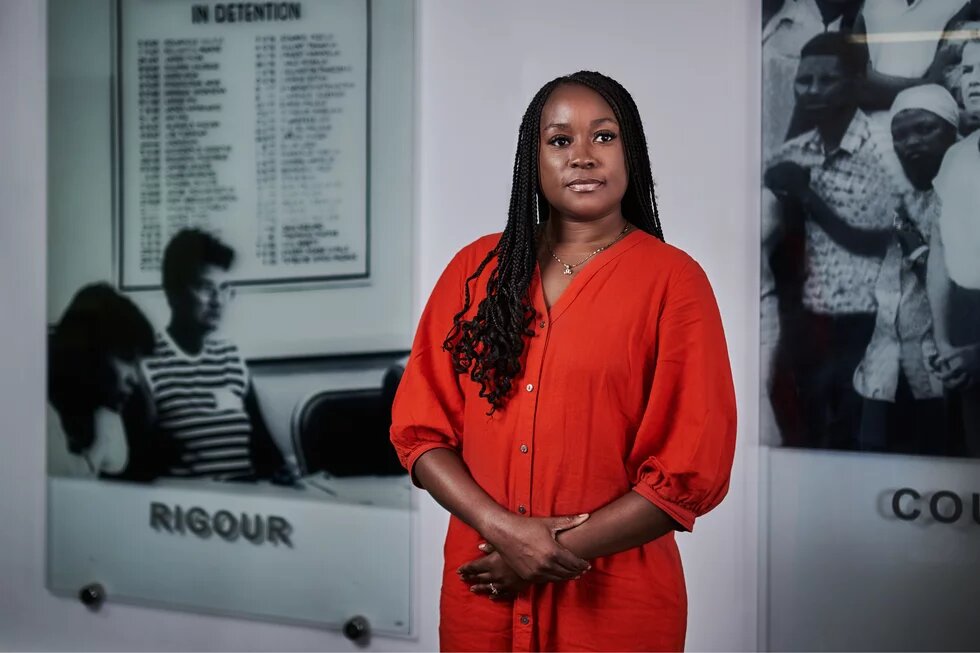From a young age, Rachel Bukasa knew she wanted to do something to safeguard against injustices, even before she had the vocabulary to articulate her passion for work in the field of human rights. Her father was the head of the national water company in the Democratic Republic of Congo, and at the time of the volatile political regime change in 1998, he made the difficult decision to move his family to South Africa. As the head of the national utility company and a father to two young daughters, he found himself in a very precarious situation.

"My career trajectory has been shaped and influenced by my supportive family. In particular, my father guided my every step as I took on a director role for an organisation at the age of 26."
While studying towards a law degree at the University of Cape Town (UCT), Rachel started volunteering for the Refugee Law Clinic (now the Refugee Rights Unit) and pursued a career in corporate law after graduating. In time she was headhunted by one of the United Nations Refugee Agency (UNHCR) implementing partners in South Africa who invited her to join the leadership of the Cape Town Refugee Centre as director. At the age of 26, she was unsure of her ability to lead an organisation of that scale, but with the encouragement of her family, she realised that her lived experiences as a child of a former refugee in South Africa provided an authentic and unique understanding to better serve the clients of the Refugee Centre.
For three years, Rachel led the Refugee Centre, which provided psychosocial assistance to the growing refugee community in Cape Town, along with both immediate and long-term responses, from educational assistance to counselling for women who were victims of military violence.
Shortly after her role at the Refugee Centre, Rachel worked for the Children’s Radio Foundation. An organisation that ensures young people from rural areas in Tanzania, DRC, South Africa and Zambia, get exposed to a diverse selection of career opportunities that they may not normally encounter. Through youth-led programming and training, they dealt with contemporary issues around sexual health, gender identity and stigma, as well as any other pressing issues that the youth were facing in their communities.
In 2021, Rachel joined Black Sash as Director. Black Sash is an organisation that has changed over the years, always working diligently for the rights of the most marginalised communities while adapting to the needs of the country it serves. Founded in 1955 as a way for white women to oppose the apartheid regime, initially campaigning against the different aspects of racial injustice, it evolved the scope of its advocacy in the preceding years, to widespread access to social security support for the most vulnerable members of society.
"Black Sash is a human rights organisation, with a deep-rooted history in the civil society landscape of our country. Despite the strides made in the socio-political environment of our country post-apartheid, there is sadly a vast majority of people that are finding themselves left in the margins of society with little to no social safety net. So we continue to advocate for the basic human rights for those people in poverty."
As with any organisation, it is important to stay abreast of the ever-changing landscape relevant to the work. With a new director at their helm, Black Sash moves towards a more ambitious goal to change the way that South Africa deals with social support.
"Expanding from focusing solely on grants, we are focusing on the concept of a social protection floor. People with little to no livelihood sources should be provided a basic support structure that includes food, housing, and healthcare."
Black Sash is currently advocating for a new social support policy, one that encompasses five human rights that many people in the country need help to obtain. These include healthcare, basic income, nutrition, basic services, and education.
Together with a coalition of NGOs around the country, they want to lobby the Government to provide this package of social protection benefits and roll it out to every member of society who needs it.
"It’s important to get government stakeholders onboard and aligned in the recognition that decisions should be made human-centric and apply a human rights lens. We need tangible and bold actions for poverty reduction that includes a basic income support package of R720, as a minimum, for people aged between 18 to 59 years with little to no income.”
At its heart, the social protection floor is the idea of a comprehensive safety net that provides the most basic of human rights to everyone in the country. And while basic income support is at the very centre of this safety net, the idea is that if everyone receives an amount of money for their basic needs, there will be an impact on education and healthcare down the line.
Rachel’s passion and drive to make a positive lasting impact on people and community continues to propel her work in the human rights sphere.
"That young woman's dreams came true in terms of being able to make an impact but I know the fight for justice and human rights continues. It can get daunting the scale of the issues and the slow progress being made not only nationally but internationally on ensuring everyone’s basic human rights are protected. Nonetheless, I am encouraged to stand for justice by focusing on my sphere of influence. I equally encourage everyone I meet to do the same”.
This story is one of a series of articles produced by The Actionists in collaboration with the Heinrich Boell Foundation's Cape Town office to highlight the incredible work of organisations and activists across South Africa in their pursuit of justice and equal rights for all.